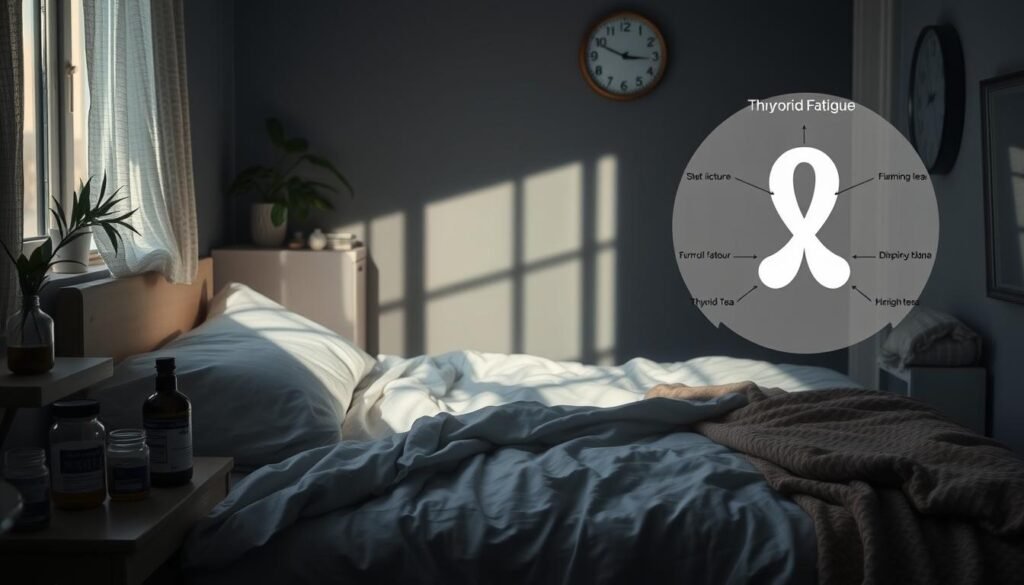Almost 5% of the U.S. population is dealing with hypothyroidism, which makes sleeping hard. This condition messes with their ability to fall and stay asleep, causing extreme tiredness and sleepiness during the day. On the other hand, hyperthyroidism hits about 1% of Americans, leading to issues like night sweats and waking up feeling anxious. Understanding the impact of these thyroid problems on sleep can help find ways to better manage insomnia.
The role that thyroid hormone levels play in sleep is huge. They’re closely linked to our body’s sleep cycles. In this piece, we’re going to dive into how thyroid health and insomnia are connected. We’ll look at the importance of hormones such as thyroxine (T4) and triiodothyronine (T3). Knowing more about this connection could help improve sleep and overall health.
Key Takeaways
- Hypothyroidism can make falling and staying asleep hard, which hurts sleep quality.
- Hyperthyroidism symptoms include night sweats and feeling cranky when waking up.
- Many with thyroid issues feel very sleepy during the day, known as hypersomnia.
- Keeping a comfy sleeping temperature can improve sleep quality.
- Thyroid problems might be treated with medications like levothyroxine for hypothyroidism.
Understanding the Thyroid Gland
The thyroid gland is a small, butterfly-shaped organ in the neck. It plays a key role in managing the body’s metabolism and energy by making vital hormones. Mainly, it makes two hormones: thyroxine (T4) and triiodothyronine (T3). These hormones affect important functions like heart rate, digestion, and body temperature.
Keeping thyroid activity balanced is essential for good health. Issues like hyperthyroidism and hypothyroidism can cause many health problems, including bad sleep. About 12 percent of people in the U.S. will have a thyroid condition. It affects women much more than men, with women five to eight times more likely to have these issues.
Studies show a strong link between thyroid and sleep problems, like insomnia and restless legs syndrome. Research also shows a two-way connection between how we sleep and thyroid function, suggesting we need more studies on this topic.
It’s key to understand these connections for better handling of thyroid and sleep problems. Many people with thyroid diseases don’t know they have them. This shows why it’s important to know about thyroid health and its effects on the body.
| Thyroid Condition | Associated Sleep Disorders | Prevalence in Population |
|---|---|---|
| Hyperthyroidism | Insomnia, Restless Legs Syndrome | 5-8 times more common in women |
| Hypothyroidism | Obstructive Sleep Apnea, Insomnia | 12% of the U.S. population |
| Thyroid Nodules | Potential sleep disturbances | 25-30% indeterminate findings |
What is Insomnia?
Insomnia makes it hard to fall or stay asleep. It badly affects one’s daily life and happiness. About one-third of adults struggle, failing to get the CDC’s advised seven hours nightly.
Those with insomnia face various sleep problems. Stress, life habits, and health issues like thyroid disorders add to the struggle. For example, some with slight thyroid issues sleep less well, research says.
Taking melatonin might help women with thyroid problems sleep better. This shows hormones have a big role in regulating sleep. Things like stress and changing work hours also affect sleep and thyroid health.
Talking to a doctor is key to understanding insomnia’s causes. They may suggest different treatments or lifestyle changes. For more on how hormones affect sleep, visit this resource.
Can Thyroid Cause Insomnia?
Thyroid disorders greatly affect how well you sleep, leading to problems like insomnia. Issues with the thyroid gland, such as hyperthyroidism or hypothyroidism, directly impact hormone levels. These changes can disrupt your sleep-wake cycle. Studies show a clear link between imbalances in thyroid hormones and sleep problems.
Link Between Thyroid Disorders and Sleep Issues
People with thyroid issues often find it hard to sleep due to hormonal imbalances. When the thyroid doesn’t produce enough hormones, known as hypothyroidism, it can lead to trouble breathing at night. This trouble increases the chance of getting obstructive sleep apnea. This condition stops and starts your breath, waking you frequently due to lack of oxygen.
Those with hypothyroidism may feel very tired during the day because their sleep is interrupted. Hyperthyroidism also causes sleep problems. It can make regulating your body temperature at night hard, leading to night sweats and insomnia.
Thyroid disorders can lead to:
- Difficulty falling asleep
- Frequent awakenings during the night
- Excessive daytime drowsiness
Not managing your thyroid hormone levels well can make these symptoms worse. It shows why a doctor’s visit and blood tests are key. They help find the thyroid problem and start the right treatment. If sleep issues don’t improve with treatment, you might need a sleep study to find other possible problems.
Keeping a good sleep routine helps in handling sleep problems caused by thyroid disorders. Tips to sleep better include:
- Having a regular sleep schedule
- Staying active daily
- Staying away from screens before bed
- Making your sleeping area soothing
Knowing how thyroid disorders and sleep issues are connected helps in managing insomnia better. Actively dealing with hormone imbalances can make your sleep quality and overall health better.
Symptoms of Thyroid Disorders
Thyroid issues affect daily life with various symptoms. Identifying them is key to getting the right help. Symptoms vary from physical to mental, and they can mess with how well you sleep.
Common Thyroid Disorder Symptoms
- Fatigue and weakness
- Weight changes, either gain or loss
- Muscle pain and myopathy
- Depression and anxiety
- Nervousness and irritability
- Heart palpitations
- Changes in menstrual cycle or amenorrhea
- Brittle nails and skin anomalies
About 80% of people with low thyroid may feel muscle pain. 10% to 25% with high thyroid could have heart issues. Changes in periods are also a sign, especially after pregnancy or during menopause.
Impact on Sleep Quality
Thyroid troubles can ruin sleep. Those with low thyroid take longer to fall asleep and aren’t happy with their sleep. On the other hand, high thyroid levels can cause insomnia. This may make you feel anxious and sweat at night.
Mood changes and thinking issues can also disturb sleep for thyroid patients. Stressful times can make these symptoms worse. If you’re facing thyroid issues, getting full treatment and support is important.
Hyperthyroidism and Sleep Problems
Hyperthyroidism greatly affects how you sleep, causing many disruptions. People often struggle to fall asleep, keep waking up at night, and feel too sleepy during the day. The root of these issues is too much thyroid hormone, speeding up metabolism and stirring the central nervous system.
How Hyperthyroidism Affects Sleep Patterns
There’s a clear link between hyperthyroidism and sleep troubles. Symptoms like night sweats and a fast heartbeat can make good sleep hard to get. Those with hyperthyroidism may also feel more anxious, which adds to sleeping problems. With stress-related sleep issues affecting about 35.2% of people, those with hyperthyroidism might find it even harder to sleep well. Handling these sleep issues well is key for staying healthy.
Associated Symptoms of Hyperthyroidism
Hyperthyroidism brings more than just sleep problems. It also causes symptoms that disrupt daily life, such as:
- Increased heart rate
- Weight loss
- Excessive sweating
- Diarrhea
- Muscle weakness
These symptoms can make sleeping even more difficult, leading to fatigue and discomfort. If hyperthyroidism goes untreated, the risks to your heart and muscles can be serious. Getting help from a doctor is crucial to help with hyperthyroidism symptoms and improve sleep.
| Symptoms of Hyperthyroidism | Effect on Sleep |
|---|---|
| Night sweats | Difficulty staying asleep |
| Anxiety | Harder to fall asleep |
| Rapid heartbeat | Frequent awakenings |
| Muscle weakness | Daytime fatigue |
It’s important to understand how hyperthyroidism and sleep issues are connected. Starting treatment early can improve sleep and life quality.
Hypothyroidism and Sleep Disturbances
Hypothyroidism can cause lots of sleep problems. It can make it hard to sleep well at night. People with this condition might deal with sleep apnea, feel very sleepy during the day, and have trouble staying asleep. Because of symptoms like feeling very cold, having muscle pain, and feeling anxious, sleep can get even worse.
Sleep Challenges Linked to Hypothyroidism
Research shows a link between hypothyroidism and sleep troubles. For example, those with hypothyroidism are much more likely to have sleep apnea. They have a 1.88 times greater risk than people with normal thyroid levels. If you have mild hypothyroidism that’s not treated, it can mess up your sleep. This means a higher chance of taking a long time to fall asleep and not sleeping long enough. It can even increase the risk of having insomnia.

Common Symptoms of Hypothyroidism
There are many signs of hypothyroidism, and they’re not just about being tired or gaining weight. Here are some of them:
- Fatigue
- Joint and muscle pain
- Poor cold tolerance
- Dry skin
- Depression
- Irregular or heavy menstrual periods
- Slow heart rate
These symptoms can lead to being very sleepy during the day, known as hypersomnia. The connection between hypothyroidism symptoms and sleep quality is important. It shows why monitoring thyroid health is crucial. To help with sleep problems, try having a regular bedtime and avoiding caffeine before bed. This is especially helpful for people struggling with sleep issues because of hypothyroidism.
Thyroid Hormone Imbalance
Thyroid hormone imbalance can impact your health a lot. This includes your sleep quality and how your hormones work. The thyroid gland is key in making hormones that control metabolism, energy, and sleep. An imbalance in T3 and T4 hormones can mess up your sleep. This shows how important it is to keep hormones balanced.
Understanding Hormonal Regulation
Hormones play a big part in many body functions like sleep. Nighttime needs low cortisol for good sleep. But high cortisol, often from stress, can ruin sleep. Also, women with low progesterone find it hard to sleep well. Too much thyroid activity can cause restlessness. Not enough can make you too tired, making night sleep tough.
Impact on the Circadian Rhythm
The circadian rhythm, or body clock, gets affected by hormone changes. Thyroid issues can mess with this rhythm and cause problems. Hormone changes, like during menopause, lower estrogen and progesterone, making sleep worse. Studies show bad sleep affects thyroid health too. A blood test can show how your thyroid affects sleep and more. For more details, visit this link.
| Thyroid Condition | Common Symptoms | Impact on Sleep |
|---|---|---|
| Hyperthyroidism | Restlessness, weight loss, fast heartbeat | Insomnia, night sweats, frequent urination |
| Hypothyroidism | Fatigue, weight gain, depression | Trouble falling or staying asleep, excessive daytime sleepiness |
| Cortisol Imbalance | Stress, anxiety | Disrupted sleep cycles, difficulty relaxing at night |
An Overview of Chronic Fatigue and Thyroid Issues
Chronic fatigue is common among those with thyroid disorders. It can feel incredibly crushing. It often signals that thyroid levels are not well managed. People with chronic fatigue thyroid may find daily tasks hard. This challenge can affect their quality of life.
Sleep loss is a big factor in feeling tired all the time. Thyroid problems can make people very tired because they don’t sleep well. Conditions like hyperthyroidism can ruin normal sleep patterns. This makes the body stressed and fighting fatigue even harder.
About 30% of people who find out they have hypothyroidism also get sleep apnea. This makes their fatigue issues worse. Mental health issues are common too with thyroid problems. For example, around 24% of those with Hashimoto’s feel depressed, and nearly 42% have anxiety. This can make sleeping and fatigue worse.

To deal with chronic fatigue and thyroid issues, a combined approach is needed. Making lifestyle changes to sleep better can ease fatigue. It’s also key to know how thyroid function affects energy. This helps people get their energy back and improve their life.
Up to one million Americans may have Chronic Fatigue Syndrome (CFS). This shows how important it is to know and manage it. Knowing about thyroid issues can help tackle chronic fatigue. For deeper insights into sleep issues and mental health, check out this info on insomnia and mental.
| Condition | Symptoms | Prevalence |
|---|---|---|
| Hypothyroidism | Extreme fatigue, OSA, anxiety, depression | Affects nearly 5% of the US population |
| Hyperthyroidism | Sleep disturbances, fatigue | Affects approximately 1% of the US population |
| Chronic Fatigue Syndrome | Persistent fatigue lasting more than 6 months | About 1 million individuals in the US |
Natural Remedies for Thyroid Insomnia
Dealing with thyroid-related insomnia means looking into natural ways to help. Making sleep a top priority is key. A few small changes can really improve your sleep quality.
Improving Sleep Hygiene
Having a regular sleep schedule is important. Sleeping and waking up at the same times every day helps. Also, make your bedroom a cozy place for sleep by keeping it dark, quiet, and cool. Avoid using screens before bed to keep your melatonin levels from dropping.
- Maintain a consistent bedtime routine.
- Avoid stimulants like caffeine and nicotine in the evening.
- Engage in relaxation techniques such as mindfulness or meditation.
Diet and Lifestyle Adjustments
Eating right is also a big part of fighting insomnia. Foods with magnesium, like nuts and greens, can help you sleep better. Adding some exercise to your week can improve your sleep too. Studies have found that exercise helps reduce insomnia symptoms.
Trying supplements like magnesium or lavender oil can also promote good sleep. Melatonin has helped many people, especially older adults, sleep better. Always talk to a doctor before starting any supplement to make sure it’s safe for you.
Thyroid Dysfunction Treatments
Managing thyroid problems involves a range of treatments based on personal health needs. Both traditional and non-traditional methods are key in reducing symptoms and boosting health. Learning about medication options and alternative therapies helps those with thyroid issues find solutions, especially for sleeping problems.
Medication Options
People with low thyroid function often take levothyroxine. This man-made hormone balances hormone levels. Sticking with this treatment and getting regular checks is important for good health. For an overactive thyroid, treatment might reduce hormones through anti-thyroid drugs or sometimes surgery. Regular doctor visits ensure the treatment plan is working well.
Alternative Therapies
Many seek alternative therapies to enhance standard treatments. Things like vitamin D and selenium may help the thyroid work better. Techniques like acupuncture and being mindful are becoming popular for stress relief and better sleep. Eating healthily is also vital, as it supports overall wellness and may ease some thyroid symptoms. Always talk to a doctor before starting these alternative therapies to make sure they fit into your overall care plan.

| Treatment Type | Details |
|---|---|
| Medication for Hypothyroidism | Levothyroxine, taken regularly, monitoring required. |
| Medication for Hyperthyroidism | Anti-thyroid drugs or surgery, depending on severity. |
| Dietary Supplements | Vitamin D, selenium, and others to support thyroid health. |
| Mindfulness Practices | Yoga, meditation, and more for stress reduction. |
| Acupuncture | Complementary therapy to promote relaxation and overall wellness. |
Conclusion
The connection between thyroid health and sleep is key to our overall well-being. Disorders like hypothyroidism and hyperthyroidism can cause sleep issues. People with thyroid problems might feel tired all the time, have dry skin, and see unexpected changes in their weight. This can make it hard to get a good night’s sleep.
It’s important to spot thyroid problems early to manage sleep troubles. Those with low thyroid levels are more likely to have sleep apnea. This condition leads to exhaustion, trouble thinking clearly, and mood swings. Tests such as sleep studies and blood work are crucial to identify these issues.
Dealing with thyroid issues usually means taking medication and changing your lifestyle. Eating balanced meals, avoiding caffeine at night, and staying active can help. By improving thyroid health, we can sleep better and improve our life’s quality.